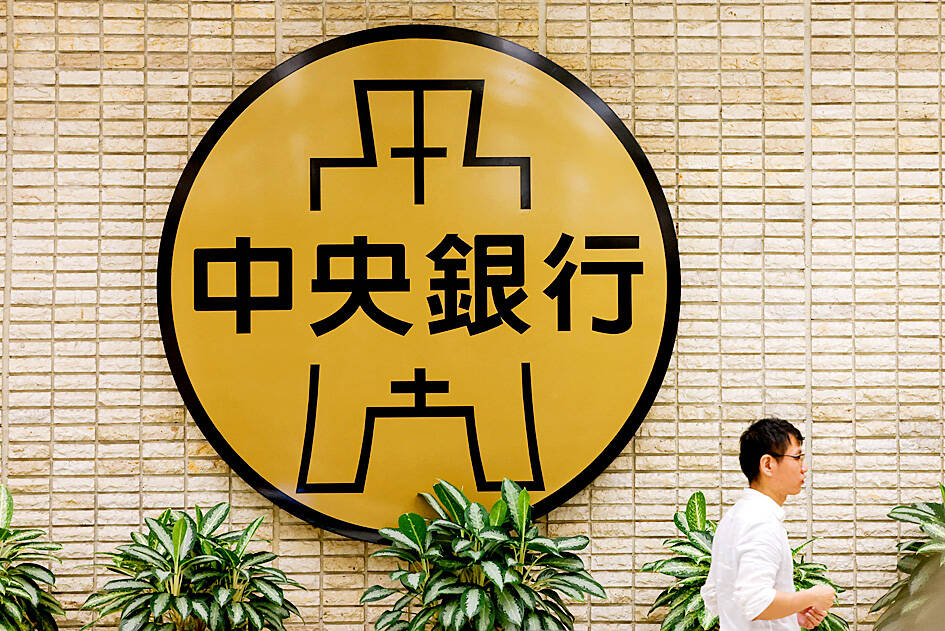GROWING PAINS:
The appreciation of the NT dollar against the greenback is another concern of the central bank, as it could affect firms’ profit margins, the economist said
The central bank would likely leave its key interest rates unchanged at its quarterly policymaking meeting on Thursday, which should be before the US makes major tariff decisions, Cathay United Bank chief economist Lin Chi-chao (林啟超) said last week.
US President Donald Trump’s chaotic tariff policy rollout has roiled markets and caused significant uncertainty, with goods made in Taiwan and imported into the US still possibly facing a 32 percent “reciprocal” tariff.
Semiconductors, the backbone of Taiwanese exports, could also be hit with even higher import duties if Trump follows through on his threats.

Photo: Ann Wang, Reuters
The global economic situation has become more complicated in the wake of Trump’s tariff policies, Lin said in an interview.
Trump’s 90-day pause on his “reciprocal” tariffs expires early next month, meaning that not only the central bank but also the US Federal Reserve would likely leave their interest rates unchanged before the results are announced.
The impact of the tariffs could become more obvious in the third quarter of this year and is expected to dramatically slow the pace of economic growth in the second half of this year, Lin said.
Taiwan’s GDP grew 5.35 percent in the first half of this year, but would only grow 1 percent in the second half, partly due to tariff concerns, the Directorate-General of Budget, Accounting and Statistics said late last month.
In addition to tariff worries, the central bank is concerned about the appreciation of the New Taiwan dollar against the US dollar, which could affect the profit margins of many Taiwanese exporters, Lin said.
The central bank aggressively intervened in the foreign exchange market last month to slow the pace of the NT dollar’s appreciation against the greenback, but only after the local currency rose by 6.21 percent on May 2 and 3.
The NT dollar remained strong last month, and without the central bank’s intervention, it would have appreciated further against the US dollar, dealers said.
The US dollar’s depreciation is expected to continue amid hopes that the Fed would cut interest rates in September and December to boost the economy, they added.
Under such circumstances, the economy should be the central bank’s top priority, rather than inflationary pressures, Lin said.
Commenting on the NT dollar’s rise, National Central University Research Center for Taiwan Economic Development director Dachrahn Wu (吳大任) said that since the beginning of this year, the local currency has appreciated almost 10 percent against the greenback.
Because of that, companies that are not tech giants with high gross margins, such as Taiwan Semiconductor Manufacturing Co (台積電), could see their bottom lines eroded sharply, Wu said.
Kinpo Group (金寶集團) founder Rock Hsu (許勝雄) on Thursday said that the rapid appreciation of the NT dollar poses a great threat to Taiwanese exporters, urging the central bank to take action to stabilize the currency.
Speaking to reporters at National Taiwan Normal University’s anniversary celebrations, Hsu said Taiwan’s export-driven economy faces stiff external competition and a more favorable exchange rate is needed.
“If the exchange rates fail to support business earnings, it would inevitably undermine firms’ international competitiveness and financing capability, so the central bank has a responsibility to act,” he said.
Regarding the effects of potential US tariffs, Hsu said the levies represent a major “black swan” for Taiwan’s industrial development, but the impact might be limited pending negotiations between governments, compared with the sharp appreciation of the NT dollar.
Additional reporting by Meryl Kao